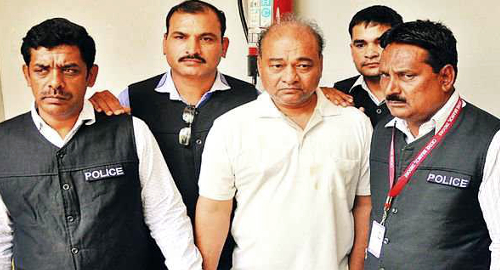 Police in India have arrested a notorious online gambling boss whose operations reportedly generated turnover of $31m per year.
Police in India have arrested a notorious online gambling boss whose operations reportedly generated turnover of $31m per year.
On Wednesday, police arrested Ramesh Chaurasia, the founder and boss of Game King Private Limited, which controls gaming parlors throughout the country that ostensibly offer non-gambling games via computer terminals, but which actually offer real-money gambling services. Chaurasia (the glum fellow pictured in white) also controls a network of computers set up in other, nondescript retail businesses across seven Indian states.
Acting on a tip, police in Indore, the largest city in Madhya Pradesh state, raided a business bearing the innocuous name of Mahinder Tour and Travel and Cyber Café, where they discovered six computers set up to allow players to gamble on roulette and other casino games. In addition to Chaurasia, police detained six other individuals, some of whom were apparently only customers.
Chaurasia’s operation was also involved in remote gambling, and once customers had registered in person, they could then gamble from anywhere via their mobile phone or desktop computers. Collection of debts and payment of winnings was handled in person through agents, like a traditional credit betting operation.
However, there was reportedly little need for distributing winnings, as police claimed that the software at the heart of the operation had been rigged to ensure that gamblers came out on the losing end.
In 2013, Chaurasia was arrested on similar charges in Mumbai and police claimed at the time that there were over 300 venues across the city in which Chaurasia had set up gaming terminals. However, Chaurasia escaped punishment, allegedly with the assistance of politicians and police officials, leading Indore police to offer a bounty for information that led to his capture.
India currently permits only ‘skill’ games like rummy or poker to be conducted for stakes online. India’s Supreme Court recently announced plans to conduct a hearing on July 14 into whether sports betting involves sufficient skill that it too deserves an exemption from the country’s 150-year-old gaming laws. The Court has been asked to either direct the central government to enact nationwide sports betting regulations or to instruct individual states on how to tackle the issue within their own borders.